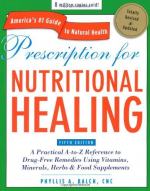|
This section contains 357 words (approx. 2 pages at 300 words per page) |
Vitamins are organic substances that are required in small amounts for normal functioning of the body. Lack of adequate quantities of vitamins results in well-known deficiency diseases, such as scurvy from Vitamin C deficiency and rickets from Vitamin D deficiency in childhood. For the most part, vitamins are not synthesized by the body but are found in a variety of foods, hence the need for a well-balanced diet or supplementation by taking the vitamins separately.
In the United States, daily minimum requirements for vitamins are recommended, and periodically reassessed, by the Food and Nutrition Board of the National Academy of Science—National Research Council. Some professionals advocate taking larger amounts of certain vitamins is for better health or for disease prevention or therapy. The question of whether vitamins are drugs is, in one sense, a semantic issue. Sometimes, very high doses of a vitamin can actually be used as a medication. For example, in very high doses—twenty or more times higher than needed to prevent the vitamin deficiency disease pellagra—niacin, a member of the B vitamin complex, lowers blood levels of cholesterol and triglycerides and niacin is commonly prescribed for this purpose.
It is possible to OVERDOSE and have serious side effects from large quantities of certain vitamins, such as vitamins A and D. Therefore, taking larger than needed amounts of vitamins should be done only with the advice of a physician. Deficiencies in vitamin intake can occur under a variety of situations including poverty, dieting, or certain disease states where antibiotics or other factors reduce vitamin absorption. Individuals who drink large quantities of ALCOHOL, for example, without adequate attention to diet often become deficient in some vitamins, such as B 1 (thiamine), and may require their administration to avoid serious and permanent toxicity. Prolonged serious shortages of Vitamin B 1 can cause the death of certain NEURONS in the brain, a situation that leads to confusion and severe impairment of short-term memory (the Wernicke-Korsakoff syndrome).
See Also
Bibliography
MARCUS, R., & COULSTON, A. M. (1990). The vitamins. In A. G. Gilman et al. (Eds.), Goodman and Gilman's the pharmacological basis of therapeutics, 8th ed. New York: Pergamon.
|
This section contains 357 words (approx. 2 pages at 300 words per page) |


